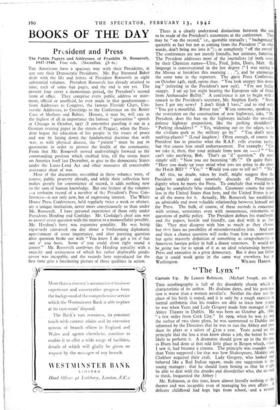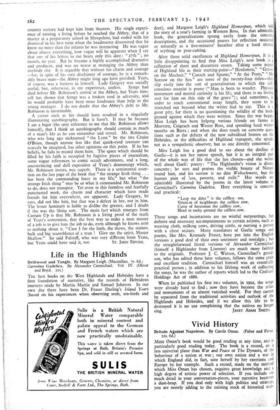"The Lynx"
Curtain Up. By Lennox Robinson. (Michael Joseph. • los. 6d.) This' autobiography is full of the disorderly charm which is characteristic of its author. He disdains dates, and his punctua- tion is worse than a woman novelist's. Neither the date nor the place of his birth is stated, and it is only by a rough exercise in mental arithmetic that his readers are able to learn how young he was when Yeats and Lady Gregory made him manager of the Abbey Theatre in Dublin. He was born on October 4th, 1886, " a few miles from Cork City." In 1909, when he was 23 and the author of two short plays, he was summoned to Dublin and informed by the Directors that he was to run the Abbey and pro- duce its plays at a salary of £15o a year. Yeats acted on the principle that the less a man knew about a job, the better he was likely to perform it. A dramatist should grow up in the theatre, as Ibsen had done at that odd little place in Bergen which, when I saw it, had become a cinema. The principle was sounder even than Yeats supposed ; for that was how Shakespeare, Moliere and Chekhov acquired their craft. Lady Gregory, who looked and behaved like a Red Indian squaw, made one suggestion to the young manager: that he should learn boxing so that he might be able to deal with the drunks and disorderlies who, she seemed to think, frequented the Abbey !
Mr. Robinson, at this time, knew almost literally nothing of the theatre and was incapable even of managing his own affairs- A delicate childhood had kept hips from school, • and a remote country rectory had kept him from theatres. His single experi- ence of earning a living before he reached the Abbey, that of a master at a preparatory school in Shropshire, had ended with his dismissal in his first term when the headmaster discovered that he knew no more than the infants he was instructing He was vague about almost everything, how vague will be apparent when I say that one of his letters to me bears only this date: " 27th " ; no month, no year. But he became a highly accomplished dramatist and producer, and was no worse at managing the Abbey than anybody else It is arguable that without his• charm and courage —for, in spite of his own disclaimer of courage, he is a remark- ably brave man—the Abbey might long ago have perished. Yeats, of course, was a fortress in himself. Lady Gregory was socially useful, but, otherwise, in my experience, useless. Synge had died before Mr. Robinson's arrival at the Abbey, but Yeats him- self has shown that Synge was a broken reed in adversity, and he would probably have been more hindrance than help to the young manager. I do not doubt that the Abbey's debt to Mr. Robinson is inestimable.
A career such as his should have resulted in a singularly illuminating autobiography. But it hasn't. It may be because I am a bigot (the only reference to me that Mr. Robinson allows himself), that I think an autobiography should contain as much of a man's life as he can remember and reveal. Mr. Robinson, who was long ago nicknamed " the Lynx " by the late Cruise O'Brien, though anyone less like that quick-eyed creature can scarcely be imagined, has other opinions on this point. If he has beliefs, he fails to record them here. The space which should be filled by his faith is occupied by fugitive pieces of journalism, some vague references to comic occult adventures, and a long, unconvincing and dull exposition of Yeats's dramaturgy which, Mr. Robinson insists, was superb. There is a sentimental asser- tion on the last page of the book that " the strange Irish thing . . . has been the commanding force in my life," but what " the strange Irish thing " may be or what it commanded Mr. Robinson to do, does not transpire. Yet even in this formless and fearfully punctuated work, the charm and character which have made friends for him everywhere, are apparent. Lady Gregory, he says, did not like him, but that was a defect in her, not in him. The lesser luminary is liable to dislike the greater, and I doubt if she was the liking sort. The main fact which emerges from Curtain Up is that Mr. Robinson is a living proof of the truth of Yeats's contention, that the best way to make a man master of a job is to give him the job to do, even although he knows next to nothing about it. " Care I for the limb, the thews, the stature, bulk and big assernblance of a man ! Give me the spirit, Master Shallow." So said Falstaff, who was very different from Yeats, but Yeats could have said it, too. ST. JOHN ERVINE.



























 Previous page
Previous page